Posted by: Northwest Eye in General on August 5, 2025
Overview
The main focus of this article is to provide you with essential tips for a successful recovery after PRK eye surgery. We understand that this can be a challenging time, and it’s important to prioritize your healing process. Following post-operative care instructions is crucial, as is managing pain effectively. Protecting your eyes from irritants, maintaining proper hydration and nutrition, and seeking support from healthcare professionals are all vital steps. These measures can significantly enhance your recovery outcomes and help you achieve optimal vision correction.
Remember, we are here to help you through this process.
Introduction
Recovery from PRK eye surgery is a crucial phase that can significantly impact the success of the procedure. We understand that this time can be both hopeful and challenging. With nearly 70% of patients achieving 20/20 vision, it’s vital to know the essential steps for a smooth recovery. However, it’s common to face difficulties during this period, from managing discomfort to adhering to post-operative care instructions.
What are the key strategies that can ensure a successful healing journey after PRK? This article unveils nine essential tips that can empower you to navigate your recovery with confidence and clarity.
Northwest Eye: Expert Guidance for PRK Eye Surgery Recovery
With over 50 years of experience, Northwest Eye is proud to be a . We specialize in a range of conditions and surgical procedures, including PRK eye surgery. Our group of proficient eye surgeons is dedicated to providing thorough care, emphasizing innovative methods and individualized rehabilitation strategies tailored to each person’s unique needs.
We understand that education plays a vital role in the healing process. Knowledgeable individuals are more likely to achieve optimal results after undergoing PRK eye surgery. Close to 70% of patients who have undergone PRK eye surgery attain up to 20/20 vision, and 92% reach 20/40 vision or better. These statistics highlight the effectiveness of this procedure.
At Northwest Eye, we ensure that you are well-informed about your healing journey. This understanding is crucial for reducing complications and enhancing satisfaction. Success stories from our previous patients underscore our commitment to excellence and the positive impact of thorough post-operative care. We are here to help you through this process, making Northwest Eye a trusted choice for those considering PRK eye surgery.
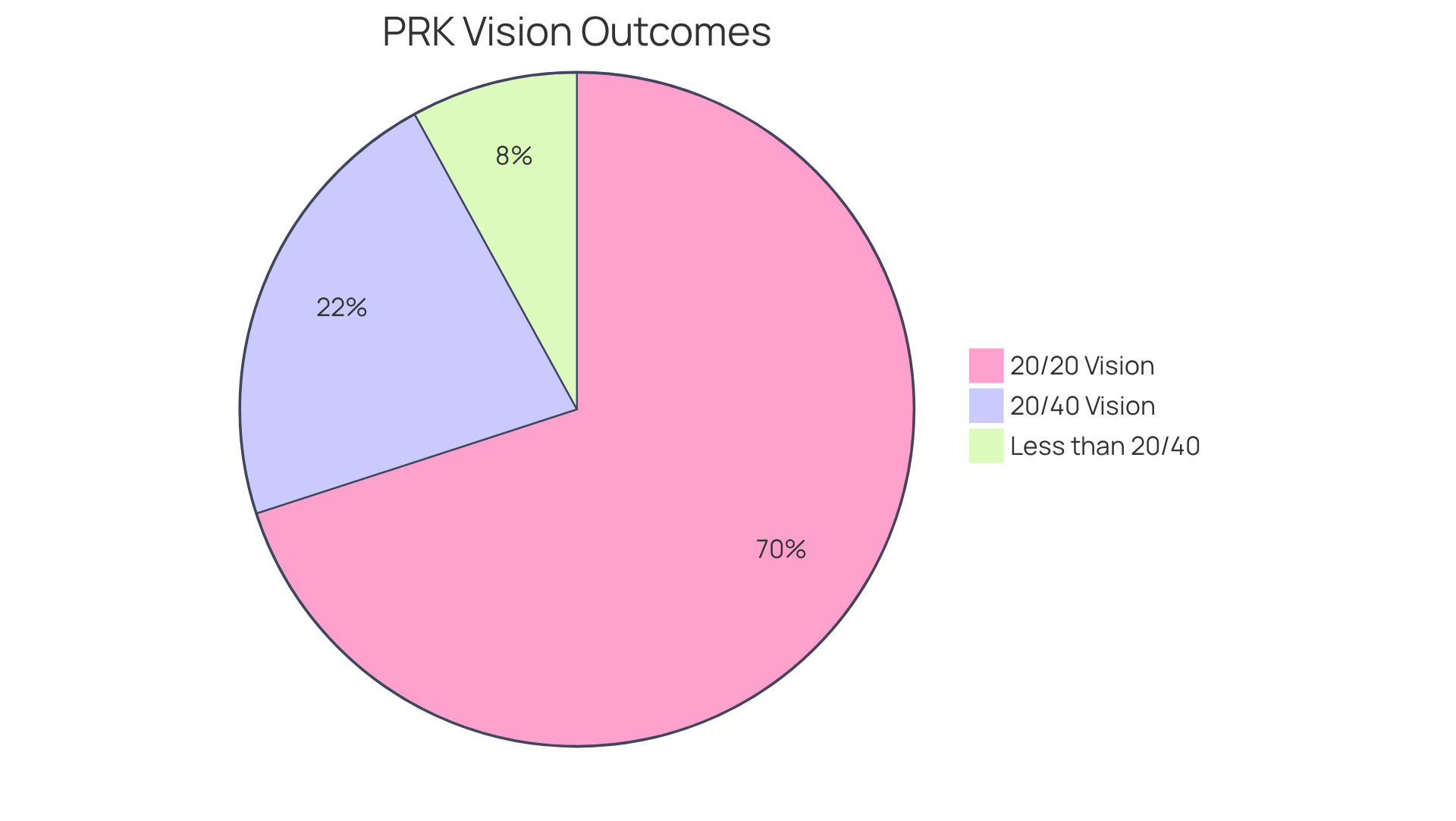
Understand Post-Operative Care Instructions Clearly
After PRK eye surgery, it is crucial to follow your surgeon’s post-operative care guidelines for a successful healing process. These guidelines typically include essential eye care practices, the timing for using prescribed eye drops, and activities to avoid during the initial healing phase. A clear understanding of these instructions can significantly enhance your healing journey and overall satisfaction with the PRK eye surgery.
For instance, using preservative-free artificial tears can alleviate dryness and irritation. Additionally, following the prescribed regimen for antibiotic and anti-inflammatory eye drops is vital to prevent infection. It’s common to feel concerned about your recovery, but steering clear of strenuous activities, protecting your vision from irritants, and avoiding swimming in bodies of water during healing can further enhance your results.
We also recommend around the eyes for at least one week post-surgery to minimize the risk of infection. By diligently adhering to these guidelines and maintaining proper hydration and nutrition, you can anticipate a smoother healing process and a greater chance of achieving your vision correction goals following PRK eye surgery. Remember, we are here to help you through this process.
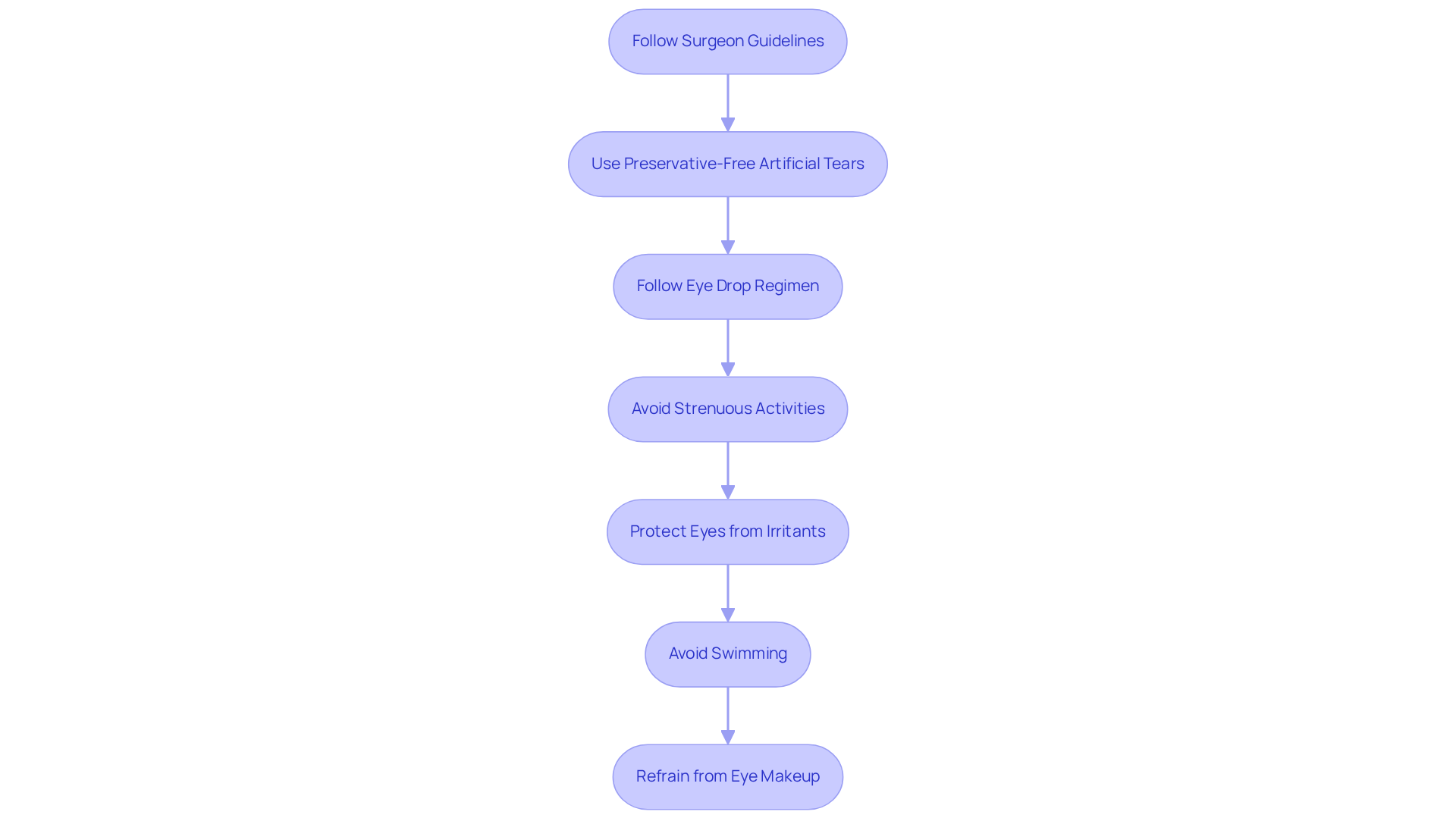
Manage Pain and Discomfort with Recommended Medications
After undergoing PRK eye surgery, it’s common to experience some discomfort. We understand how challenging this can be, but rest assured that can help manage this pain effectively. Over-the-counter options like ibuprofen and acetaminophen are often recommended, as they can alleviate mild to moderate discomfort. For those who need a bit more relief, your ophthalmologist may prescribe stronger pain medications tailored just for you.
Following the recommended medication schedule is crucial. Not only does it help reduce discomfort, but it also encourages a smoother healing process. Recent studies have shown that topical NSAIDs, such as ketorolac, may offer better pain control compared to oral medications. In fact, peak pain scores for those using oral NSAIDs averaged 5.82, while those using topical alternatives reported an average of 4.2. It’s important to note that pain tends to be most intense on days 2 and 3 after PRK eye surgery, so managing your expectations during this time can be very helpful.
Many patients have found that effective pain management greatly enhances their overall satisfaction with the recovery process. This highlights the importance of closely following your medical advice. Additionally, ensuring a proper fit for your contact lenses is critical for both pain management and epithelial healing, further underscoring the need for attentive postoperative care. Remember, we are here to help you through this process, and your comfort is our priority.
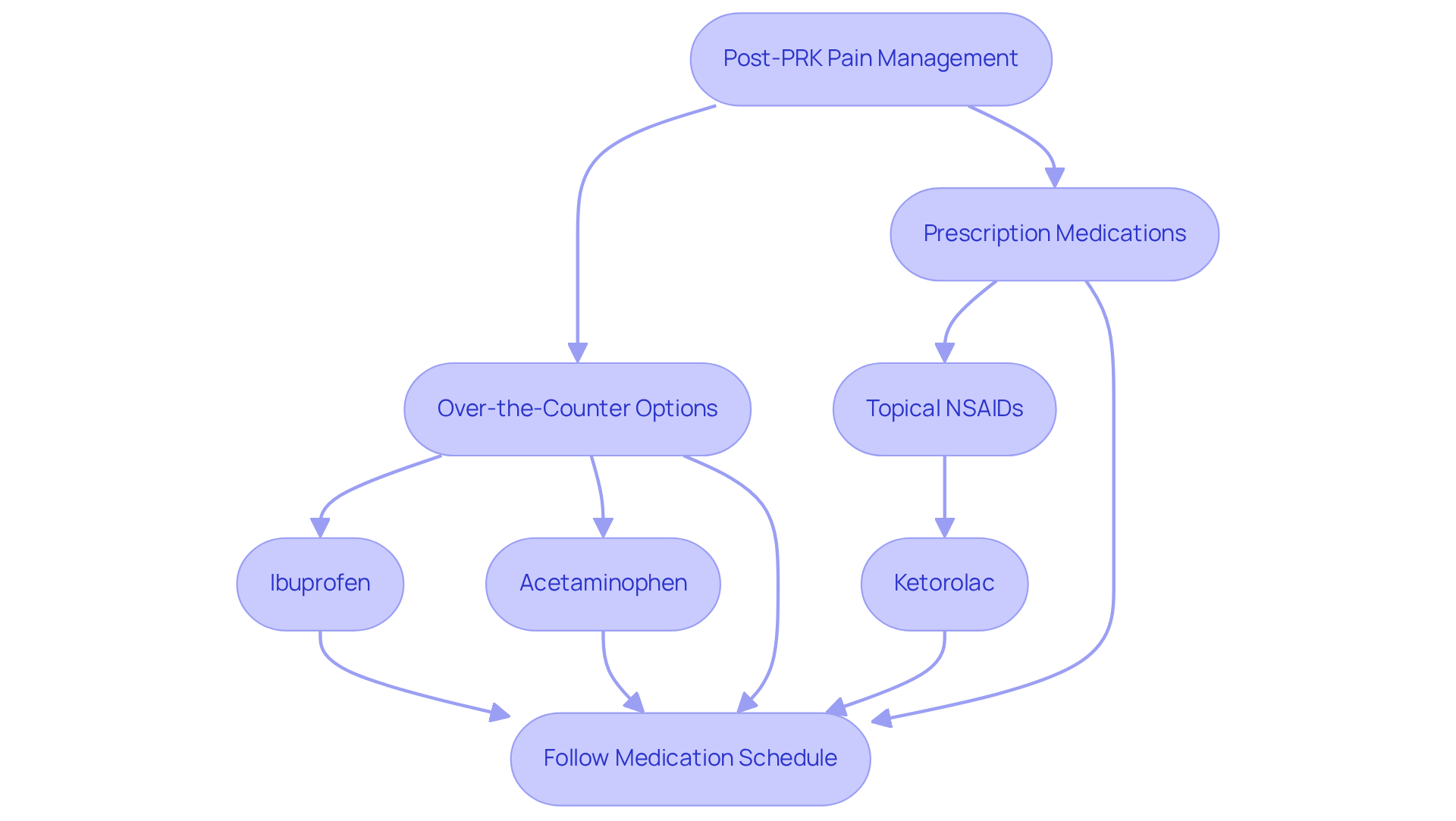
Protect Your Eyes from Sunlight and Irritants
After undergoing PRK eye surgery, we understand that your vision may be sensitive to light and irritants. It’s important to wear UV-blocking sunglasses when you are outdoors to protect your eyes from harmful rays. We know that avoiding dust, smoke, and other irritants can help during your healing process. Keeping your environment clean and using protective eyewear can significantly enhance your recovery. Remember, we are here to help you through this process.
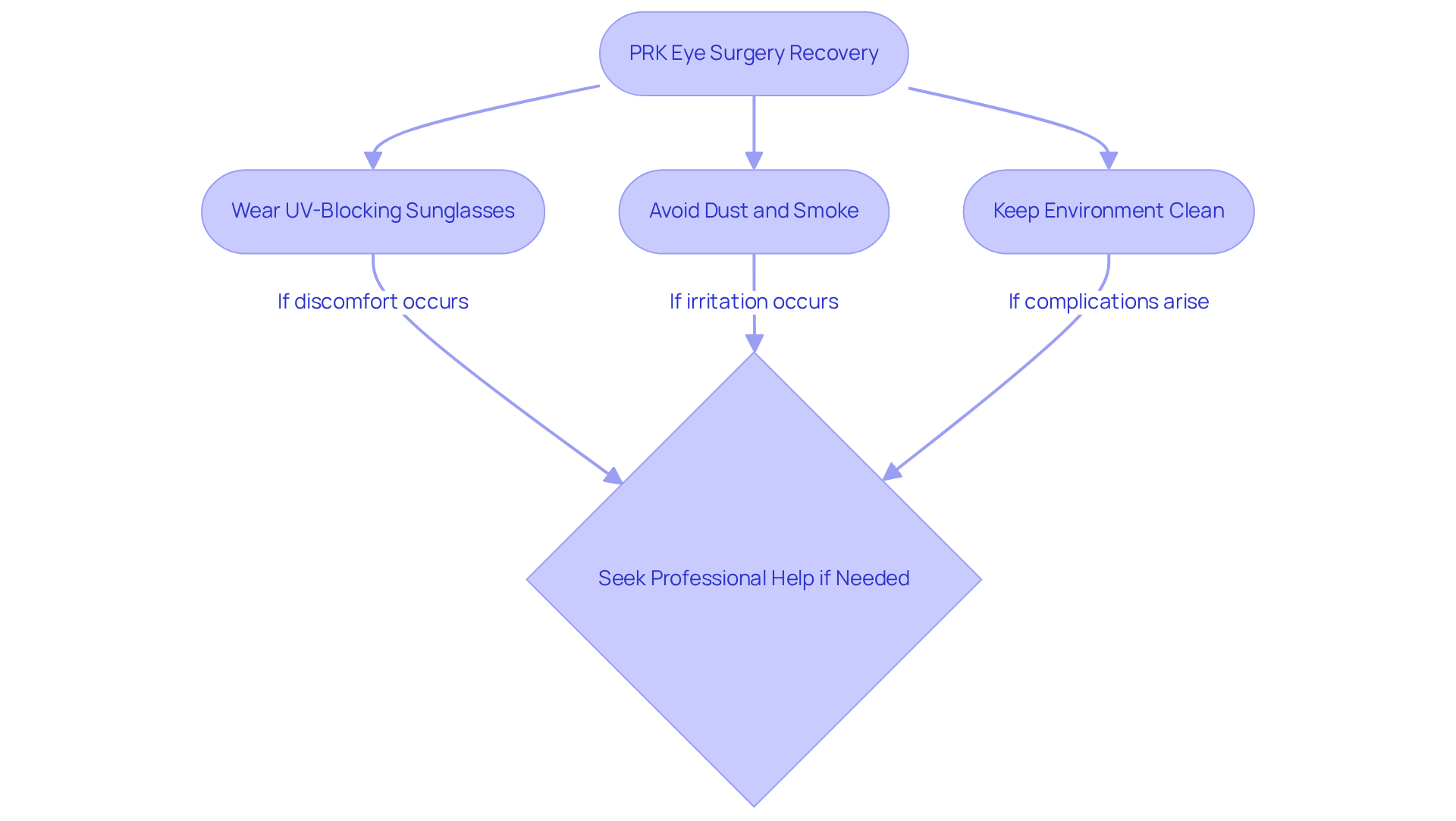
Schedule and Attend Follow-Up Appointments Regularly
Regular follow-up appointments play a crucial role in your healing journey after PRK surgery. We understand that this process can be overwhelming, but these visits allow your ophthalmologist to monitor your progress, identify any potential complications, and adjust your treatment plan as needed. Research shows that consistent follow-up care significantly enhances outcomes, with 93.2% of eyes remaining stable at the 10-year mark after surgery.
Attending all scheduled appointments is essential. It enables timely interventions if any issues arise, ensuring that you receive the best care possible. Open communication with your surgeon during these visits is vital; sharing your concerns can lead to more personalized care that meets your specific needs. Insights from ophthalmologists highlight that closely monitoring your healing can prevent complications and help achieve optimal visual results.
With , the importance of follow-up care has never been more pronounced. It directly correlates with long-term success and your satisfaction as a patient. Post-operative care typically involves administering ciprofloxacin eye drops and betamethasone to support your healing process.
Additionally, understanding potential risk factors for myopic regression, such as your pre-operative myopia levels and corneal traits, can empower you to make informed decisions regarding your recovery. Remember, we are here to help you through this process, and your well-being is our top priority.
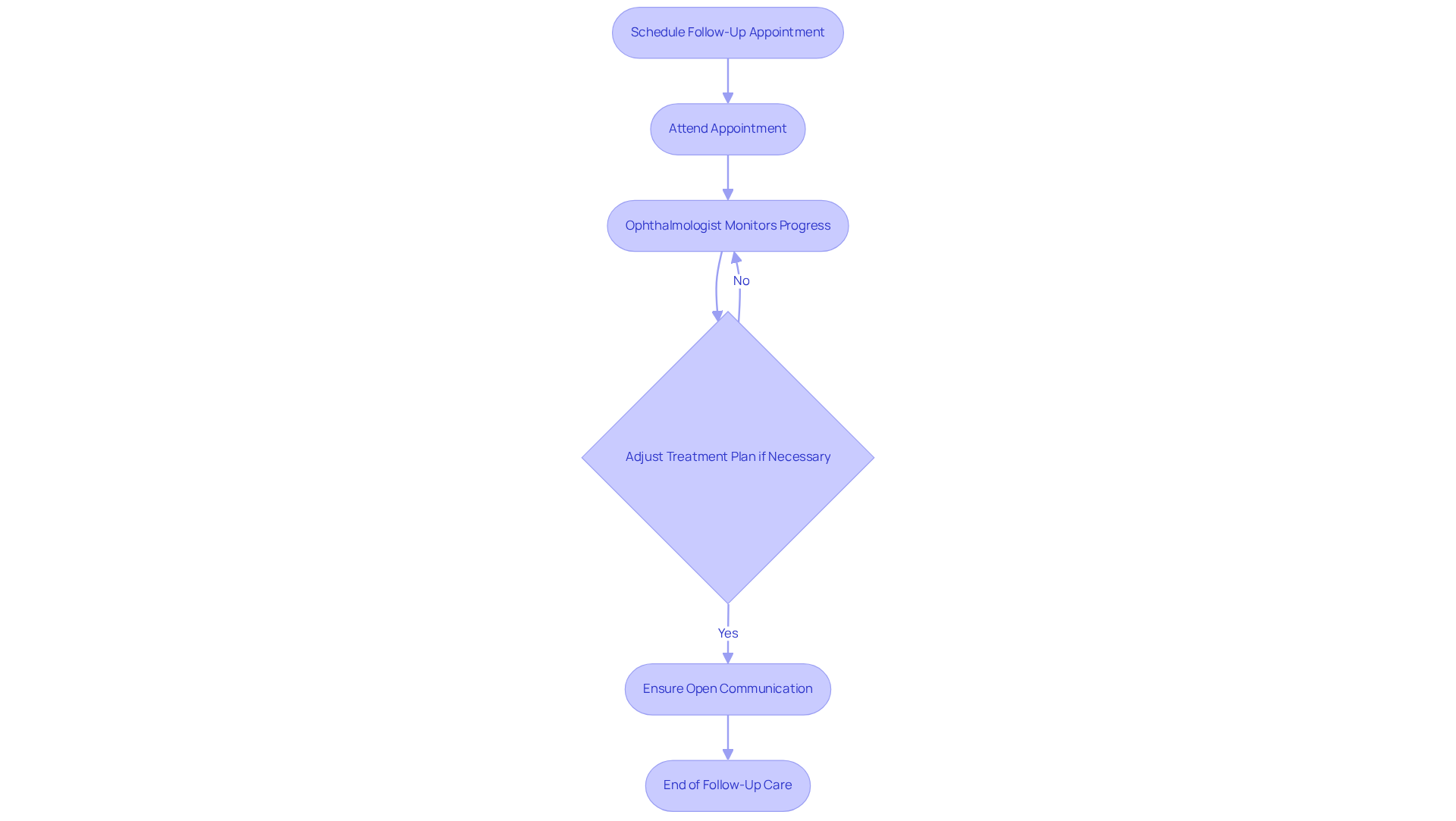
Avoid Strenuous Activities and Heavy Lifting
In the days following your PRK surgery, we understand that you may have concerns about your recovery. It’s important to avoid strenuous activities and heavy lifting during this time. These actions can elevate pressure in your vision and obstruct the healing process. Instead, focus on gentle activities such as walking or light stretching, which allow your body to rest and recuperate effectively.
Dr. M. Ronan Conlon emphasizes, ‘It’s important to follow your ophthalmologist’s post-operative instructions after PRK eye surgery to minimize the risk of side effects.’ Your surgeon will provide specific guidelines on when you can safely resume normal activities, typically recommending to after surgery. Remember, complete cornea healing and vision stabilization may take up to three months. Adhering to these recommendations is essential for a smooth healing journey and optimal visual outcomes. We are here to help you through this process.
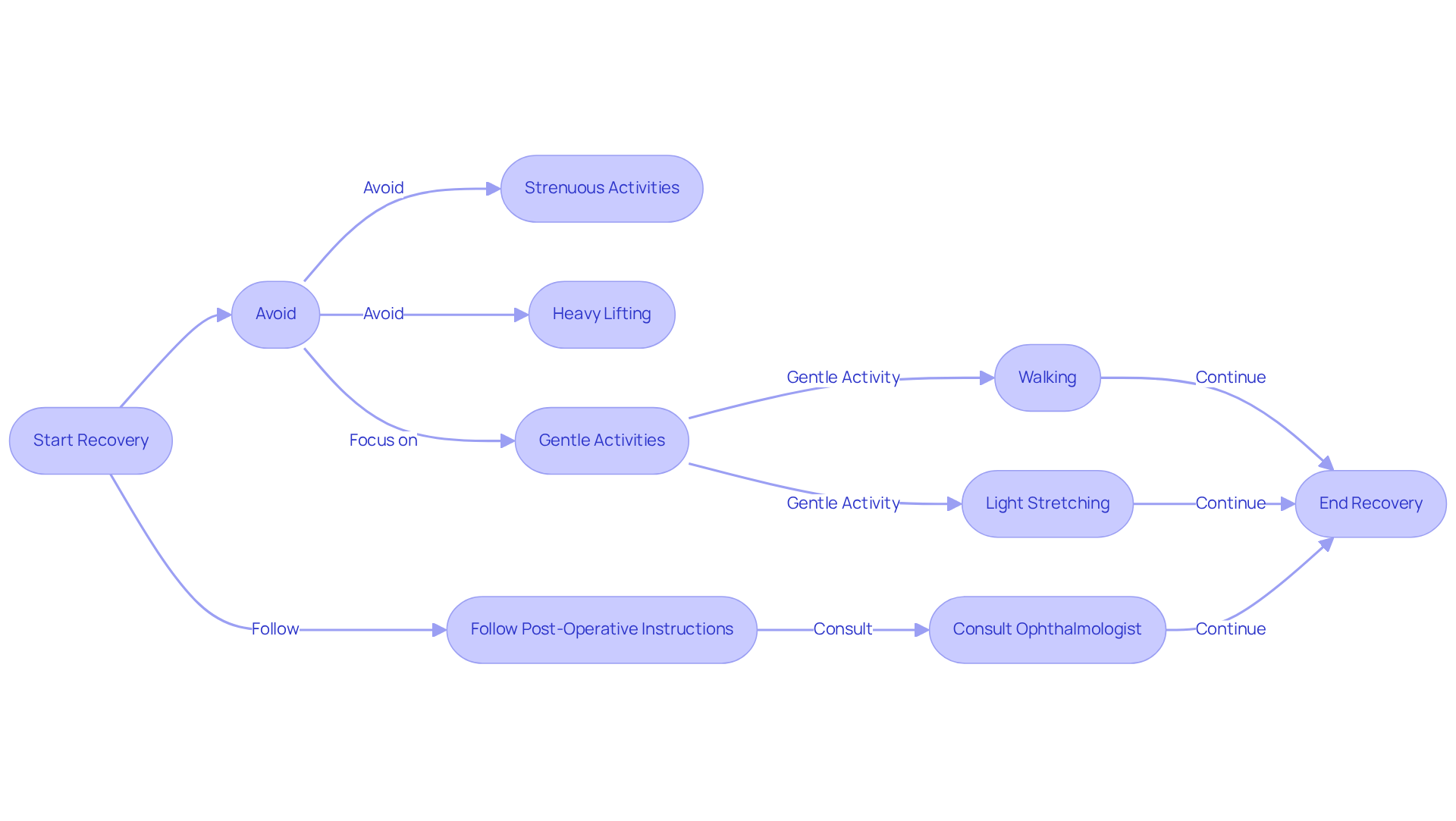
Maintain Proper Hydration and Nutrition for Healing
Proper hydration and a balanced diet are essential elements for a successful recuperation after undergoing PRK eye surgery. We understand that this can be a challenging time, and staying well-hydrated by drinking ample water not only supports overall bodily functions but also aids in the healing process. Nutrient-rich foods, including a variety of fruits, vegetables, and lean proteins, play a crucial role in reducing inflammation and enhancing eye health.
For instance, the American Heart Association recommends consuming at least 3.5 cooked ounces of fatty fish, such as salmon and walnuts, at least twice a week to ensure adequate omega-3 fatty acids. These can significantly alleviate dry eye symptoms, a common concern post-surgery. Furthermore, antioxidants present in vibrant fruits and vegetables, together with Vitamin E—a potent antioxidant that safeguards eye cells from free radicals—assist in shielding the eyes from oxidative stress, facilitating quicker healing.
Zinc is also , with the recommended dietary allowance being 11 mg for men and 8 mg for women. Following nutritional guidelines that emphasize hydration and a diet rich in essential vitamins and minerals can lead to improved outcomes and a smoother healing journey after PRK eye surgery. As Mara Sugue notes, “Ultimately, scientific data from the past decade reinforce a core principle: proactive, nutrition-centered strategies can significantly affect how well and how long we see.” We are here to help you through this process.
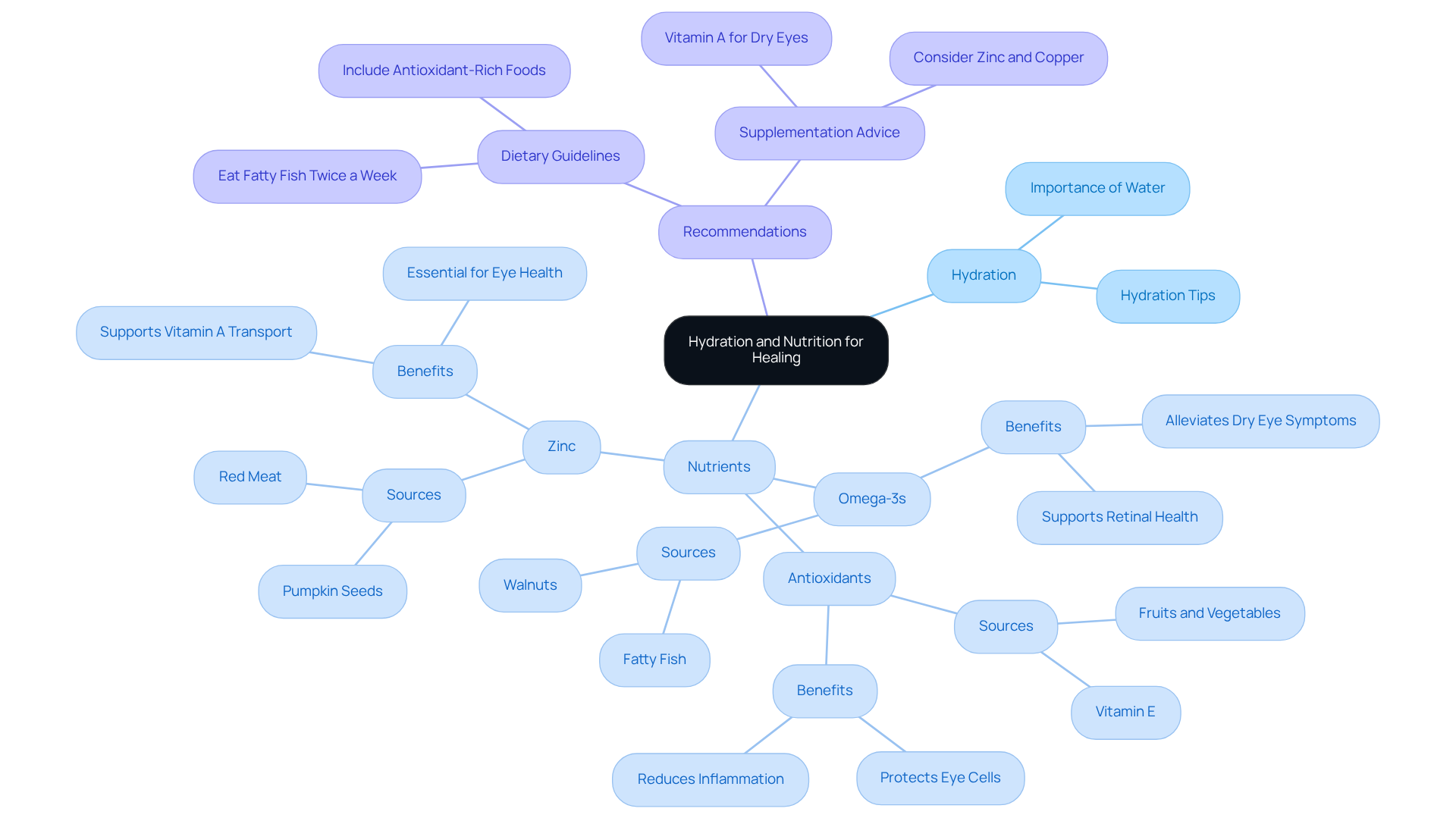
Use Prescribed Eye Drops and Medications as Directed
After undergoing PRK surgery, we understand that you may have concerns about your recovery. Your ophthalmologist will prescribe specific , such as antibiotic and anti-inflammatory drops, to help manage pain, prevent infection, and facilitate healing. It’s crucial to adhere to the prescribed regimen, including the frequency and duration of use—typically about one month. Missing doses or not following guidelines can lead to complications and prolong your healing time.
Research shows that proper use of eye drops significantly reduces the risk of chronic dry eye, with chronic dry eye cases after PRK reported at just 6 cases (5.0%). We encourage you to maintain a consistent schedule for your medications, as this adherence is directly linked to improved recovery outcomes. Practicing good hygiene when using eye drops is also essential to prevent complications.
Remember, regular follow-ups with your ophthalmologist will help monitor your healing process and address any concerns regarding your medication regimen. We are here to help you through this process, ensuring your journey to recovery is as smooth as possible.
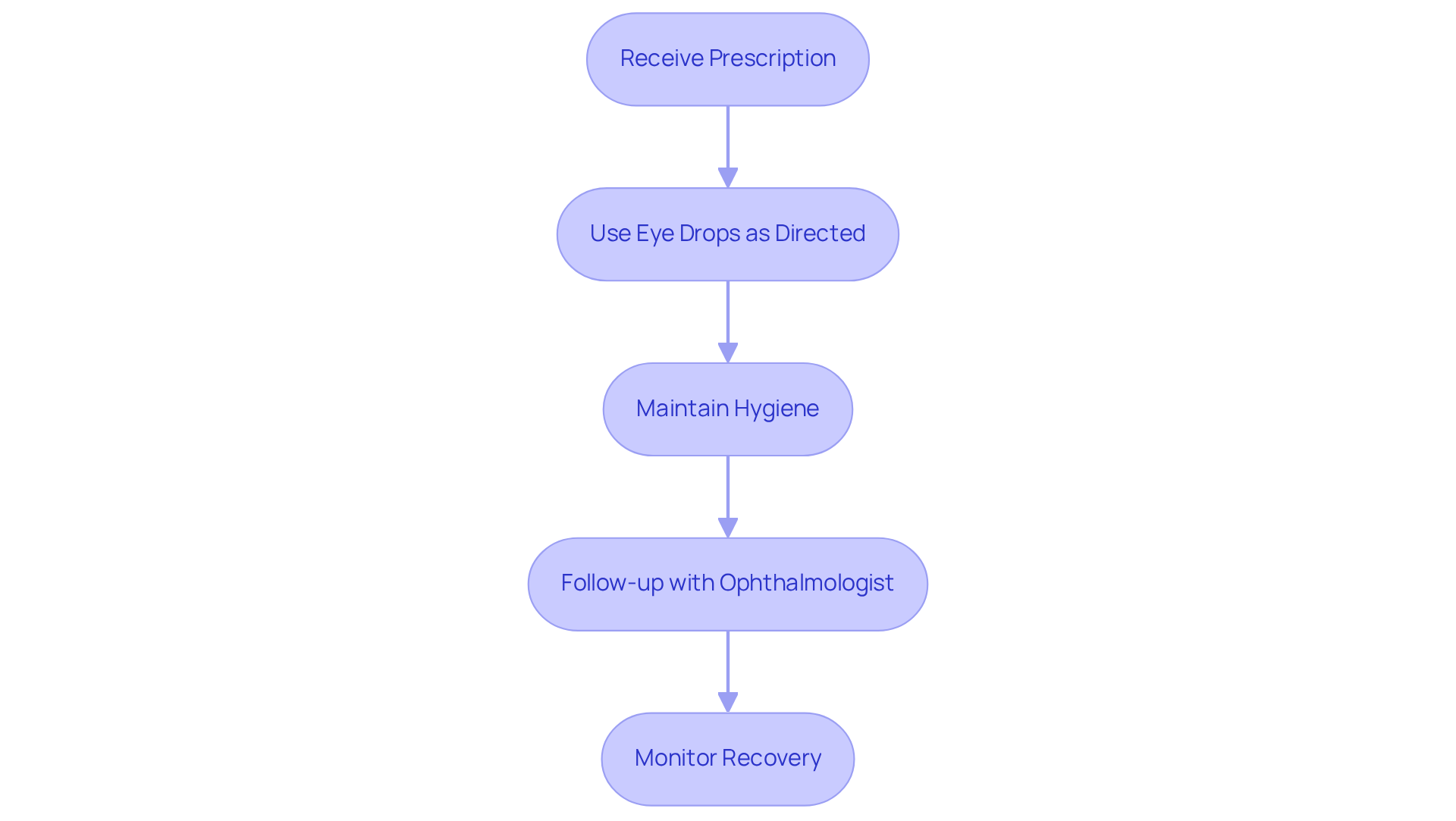
Be Patient: Understand Recovery Takes Time
Recovery from PRK surgery is a gradual journey that requires patience and understanding. We understand that while many individuals may start to notice improvements in their vision within just a few days, . It’s common to experience fluctuations in vision during this time as your cornea stabilizes and adapts. According to eye specialists, “it can take up to three months for the vision to be completely clear, sharp, and stable.” Therefore, it’s essential to stay calm and follow your surgeon’s recommendations to achieve the best possible outcome.
Statistics indicate that:
- 70.3 percent of patients report being very satisfied with their vision after refractive surgery.
- Most experience significant vision improvement within a month.
- Many achieve visual stability within three to six months post-surgery.
Embracing this timeline and adhering to prescribed care can greatly enhance your healing experience. Remember, we are here to help you through this process.
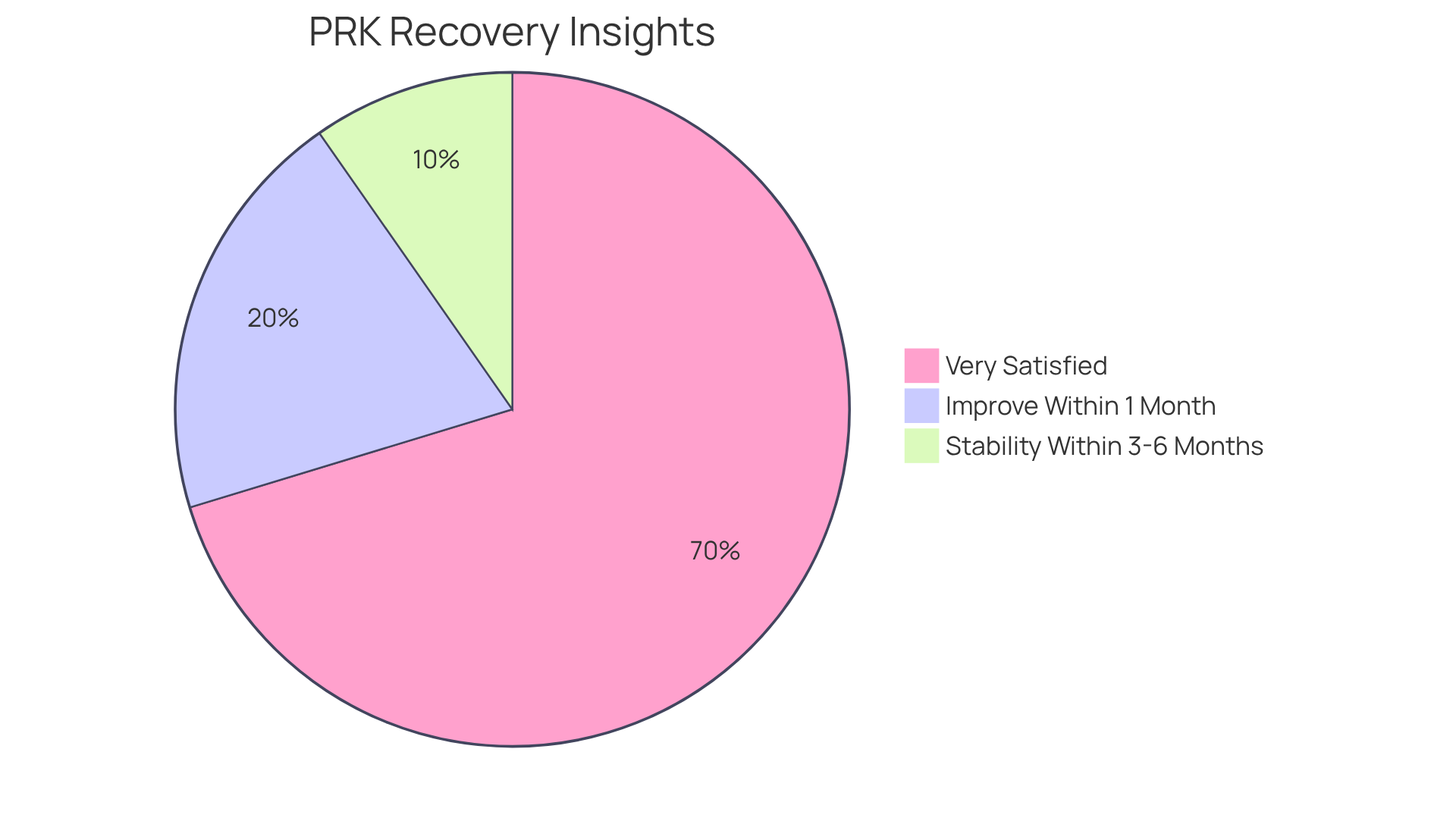
Seek Support and Guidance from Healthcare Professionals
During your healing process from PRK eye surgery, we understand that it is essential to actively seek support and guidance from your healthcare professionals. Whether you have inquiries about your , face unforeseen symptoms, or simply require reassurance, your surgical team is here to assist you. Effective communication with your healthcare providers can significantly enhance your healing experience, ensuring you stay informed and confident throughout this process.
Surgeons often emphasize the importance of this dialogue. It’s common to feel uncertain, and patients who engage openly with their medical team tend to report higher satisfaction levels and better outcomes. For instance, Dr. Smith, a prominent eye specialist, states, ‘Patients who express their worries and inquiries generally experience smoother healing and feel more empowered in their treatment journey following PRK eye surgery.’
To further support your recovery, consider the following actionable tips:
- Keep a Recovery Journal: Document your symptoms and questions to discuss during follow-up appointments.
- Schedule Regular Check-Ins: Don’t wait for your next appointment; reach out if you have concerns.
- Ask for Clarification: If you don’t understand something, please ask your healthcare provider to explain it again.
By fostering a collaborative relationship with your healthcare professionals, you can navigate your recovery more effectively and address any concerns promptly. Remember, we are here to help you through this process.
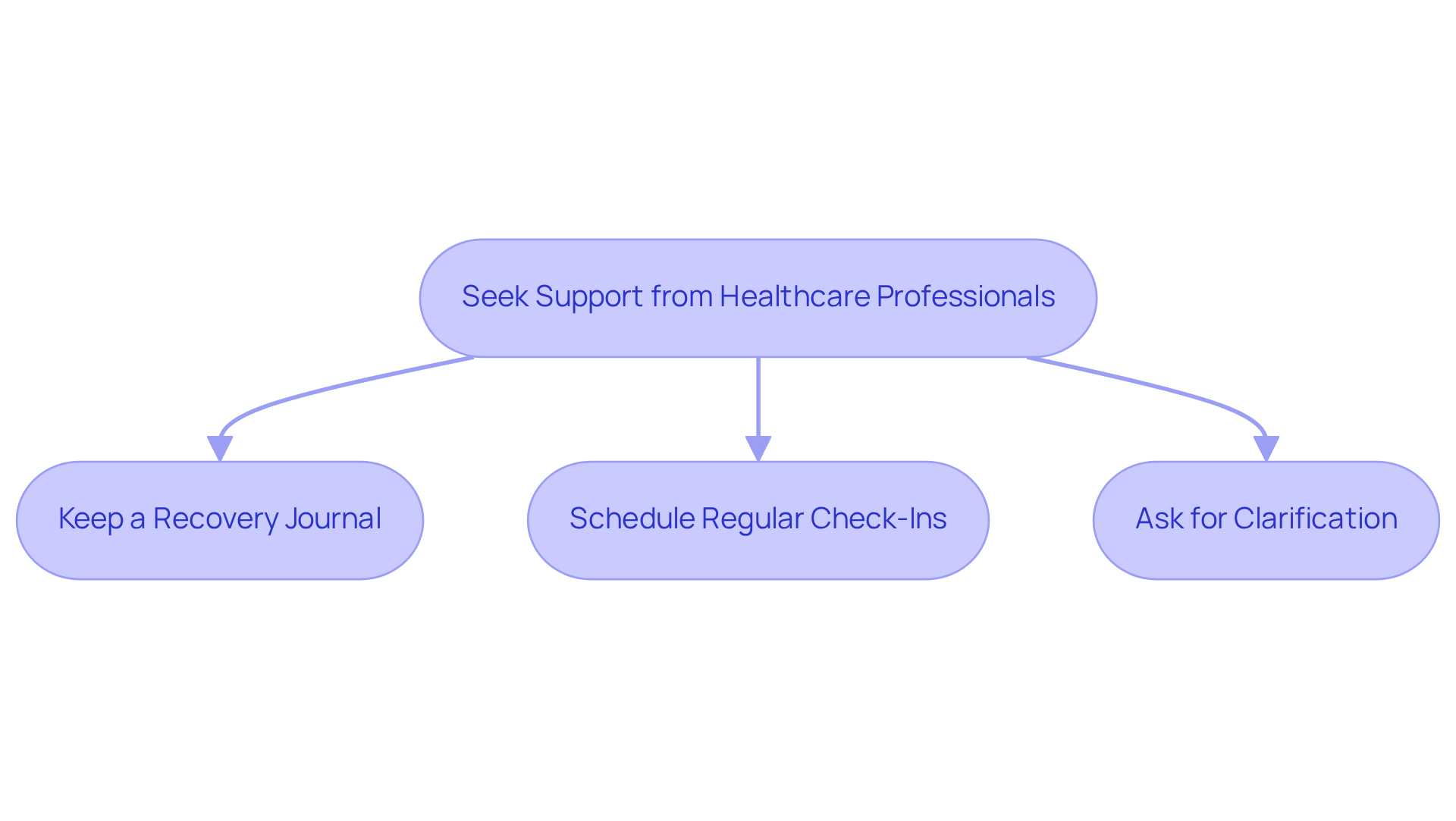
Conclusion
The journey of recovery after PRK eye surgery is crucial for achieving optimal vision correction and overall satisfaction. We understand that this can be a challenging time, and knowing the essential post-operative care instructions, managing discomfort, and protecting your eyes are vital components of this process. By adhering to medical advice and maintaining open communication with healthcare professionals, you can navigate your recovery more effectively and enhance your healing experience.
Key insights from this guidance highlight the importance of:
- Following prescribed medication regimens
- Attending follow-up appointments
- Making lifestyle adjustments, such as proper hydration and nutrition
These steps not only facilitate a smoother recovery but also significantly reduce the risk of complications. Embracing patience and seeking support throughout this journey will empower you to achieve your vision goals and improve your quality of life.
Ultimately, your commitment to following these essential tips can transform the recovery experience after PRK eye surgery. With the right approach, you can look forward to the benefits of clearer vision and the freedom that comes with it. It is imperative to prioritize these strategies and make informed decisions, ensuring a successful and fulfilling recovery journey.
Frequently Asked Questions
What is PRK eye surgery and what are its success rates?
PRK eye surgery is a procedure designed to correct vision. Approximately 70% of patients achieve up to 20/20 vision, and 92% reach 20/40 vision or better after the surgery.
Why is education important for PRK eye surgery recovery?
Education is crucial because knowledgeable patients are more likely to achieve optimal results, reduce complications, and enhance satisfaction during the healing process.
What are the key post-operative care instructions after PRK eye surgery?
Key post-operative care includes using preservative-free artificial tears to alleviate dryness, following the prescribed regimen for antibiotic and anti-inflammatory eye drops, avoiding strenuous activities, protecting your eyes from irritants, and refraining from swimming in bodies of water during the healing phase.
How long should I avoid wearing makeup after PRK eye surgery?
It is recommended to avoid wearing makeup around the eyes for at least one week post-surgery to minimize the risk of infection.
What medications are recommended for managing pain after PRK eye surgery?
Over-the-counter medications like ibuprofen and acetaminophen are often recommended for mild to moderate discomfort. For more severe pain, your ophthalmologist may prescribe stronger medications.
When is pain typically most intense after PRK eye surgery?
Pain tends to be most intense on days 2 and 3 after the surgery, so managing expectations during this period is important.
How do topical NSAIDs compare to oral medications for pain management after PRK?
Recent studies suggest that topical NSAIDs, such as ketorolac, may provide better pain control compared to oral medications. Patients using topical alternatives reported lower average pain scores.
Why is it important to have a proper fit for contact lenses after PRK surgery?
A proper fit for contact lenses is critical for both managing pain and promoting epithelial healing, highlighting the importance of attentive postoperative care.






